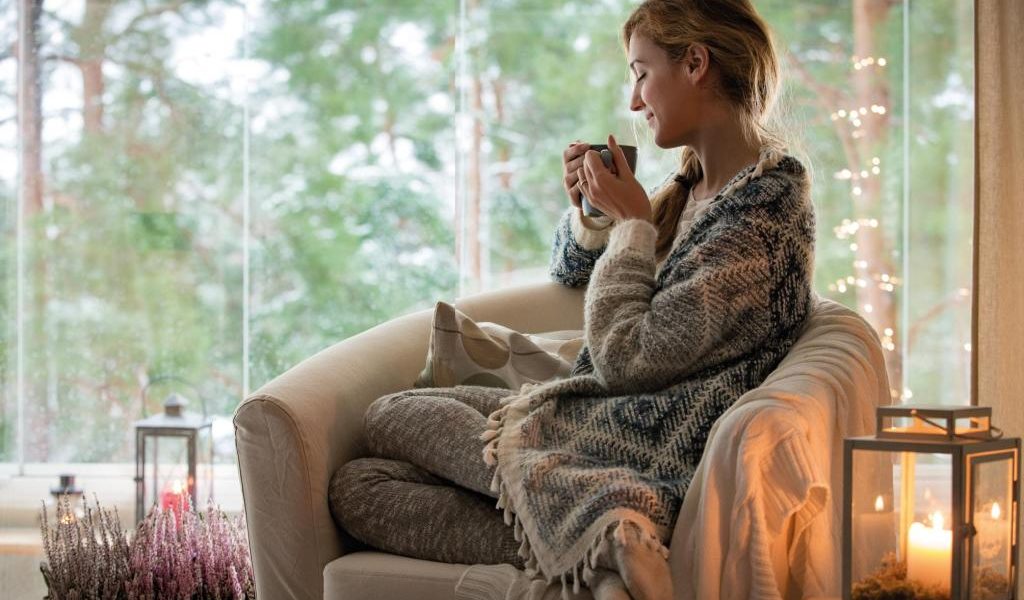Far more than a hot bath and face mask on a quiet night in, self-care isn’t just the occasional pampering session (although it’s a great place to start!) Instead, it extends far deeper and is a commitment to looking after yourself on the inside by putting your mental and emotional wellbeing first. And it’s not to be dismissed as just a gimmick either, as the entire wellness industry, of which self-care is a popular sector, is said to be worth roughly £3 trillion – the health trend is certainly growing.
“I believe there are two main types of self-care – recreational and transformative,” explains Julie Montagu, life coach and author of Recharge: A Year of Self-Care to Focus on You (£12, amazon.com). “Both are necessary, but they serve different purposes. Recreational self-care is a quick escape, such as a massage, spa appointment, weekend getaway or vacation. This type of self-care lifts our spirits and mood temporarily, clears the mind for a while, and allows us to let go of stress in the short term.” Although taking care of yourself is nothing new, this version of self-care is probably what you’re most familiar with. And while this is important, don’t forget to look after yourself on the inside, too. “Transformative self-care is on a whole different level, whereby we are able to nourish ourselves deep within and not just on the surface. This kind of self-care is an investment in our present and future wellbeing, and overall happiness. But you must sacrifice some of your time and energy so that you can truly recharge for life.”
Wellbeing coach and creative feng shui consultant Alexandra Lees (wuweiwisdom.com) echoes this point: “Self-care is self-love in action,” she says. “It’s the simple things you can do for yourself to support and nurture your mind, body and soul. A daily self-care regime will help you become healthier, more authentic and balanced. This, in turn, will benefit all aspects of your life, including your relationships and career. Before you can develop a positive self-care habit, it’s vital to overcome any inner-resistance that will stifle your practice.”
Why it’s important
Living in an era of constantly being on the go, doing everything and ‘having it all’, the last thing on an ever-growing to-do list is slowing down and dedicating time to yourself. But, with research from Virgin showing that 51 percent of full-time UK employees have experienced burnout, perhaps it’s about time to finally put yourself first. “The signs of neglecting self-care are very easy to spot,” says balance coach Helen Hopkins. “Tiredness, fatigue, irritability, weight gain, mood swings and a general lack of lustre for life are common signals that you’ve perhaps fallen off the wagon in caring for yourself – but this can be reversed quite easily and without spending too much money. Self-care, of course, has to become your own version of self-care, and if you don’t have the time or inclination to do everything on the list then adapt it to your own needs.”
30-minute self-care habits to try today
Tech detox
“Many of us find ourselves lying in bed at night replying to emails or checking our phones – and we continue this as soon as we’ve opened our eyes in the morning, often before we’ve even left our bed,” says life coach Lynette Gray. “Switch your phone to aeroplane mode and turn off any WiFi connections an hour before going to bed. Keep it that way for an hour after waking. This encourages you to wind down at night and also starts the day positively. If the first thing you do is look at your phone, you are reacting, which encourages continual reactive behaviour throughout the day. If you don’t look at your phone, you are thinking proactively about the day ahead, which promotes productivity.”
Meditation
“Wake up just 15 minutes earlier than normal, then sit comfortably in a room other than your bedroom, close your eyes and simply sit in silence, focusing on regular deep breaths to bring yourself into a meditative state,” advises Lynette. “Meditation is emotional, and it’s often during this time we are able to work out what we miss or want from daily life. Giving yourself just a few minutes to do this will allow you to re-centre and focus for the day ahead.”
Journaling
There is a lot of power in putting pen and paper “Journaling can give intention to goals, which encourages you to pursue what normally remains in your head. It also takes the power out of negative thinking,” says Lynette. “An inner voice speaks to you daily and, more often than not, what is said is not kind. By writing it down, you can track how you speak to yourself and subjectively determine whether it is true or necessary. To counter negative thinking, we must tell ourselves daily all of the positive things about ourselves.”
Create a home spa
“This is super if you’re a busy mum on a budget,” says Helen. “Creating a spa experience at home, with a bath, face mask, meditation, candles and a nice magazine, is a great way to unplug from the family for 30 minutes without having to leave the comfort of home”
The right fuel
“Be kind to yourself by eating lovely, fresh, nutritious food that fuels your body,” suggests Helen. “If you’re stuck for ideas, pick up the dusty old recipe book you haven’t seen for years (don’t go online!)”
Movement
“Don’t neglect exercise – even if you’re tired,” advises Helen. “Try yoga, Pilates or walking to calm the mind and move the body. You will feel more energised afterwards.” You don’t even have to leave home either as there are plenty of online fitness videos you could follow.
Misconceptions about self-care
Alexandra identifies ideas that you may have prior to practising self-care.
1. ‘I don’t deserve it’: Self-care is not selfish, it’s self-focused and you’re worth it. Practising self-care doesn’t mean you can’t give to others, and you’ll be more able to help, both emotionally and physically, if you nurture yourself first.
2. ‘I don’t have the time or money’: Self-care doesn’t mean long afternoons luxuriating in expensive spas. It’s about simple, low cost or no-cost practices you can easily incorporate into your normal routine.
3. ‘Self-care is not my responsibility’: Always seeking external support and validation is disempowering. Taking full self-responsibility for your own self-nurturing is an extremely liberating and a life-affirming practice.





















